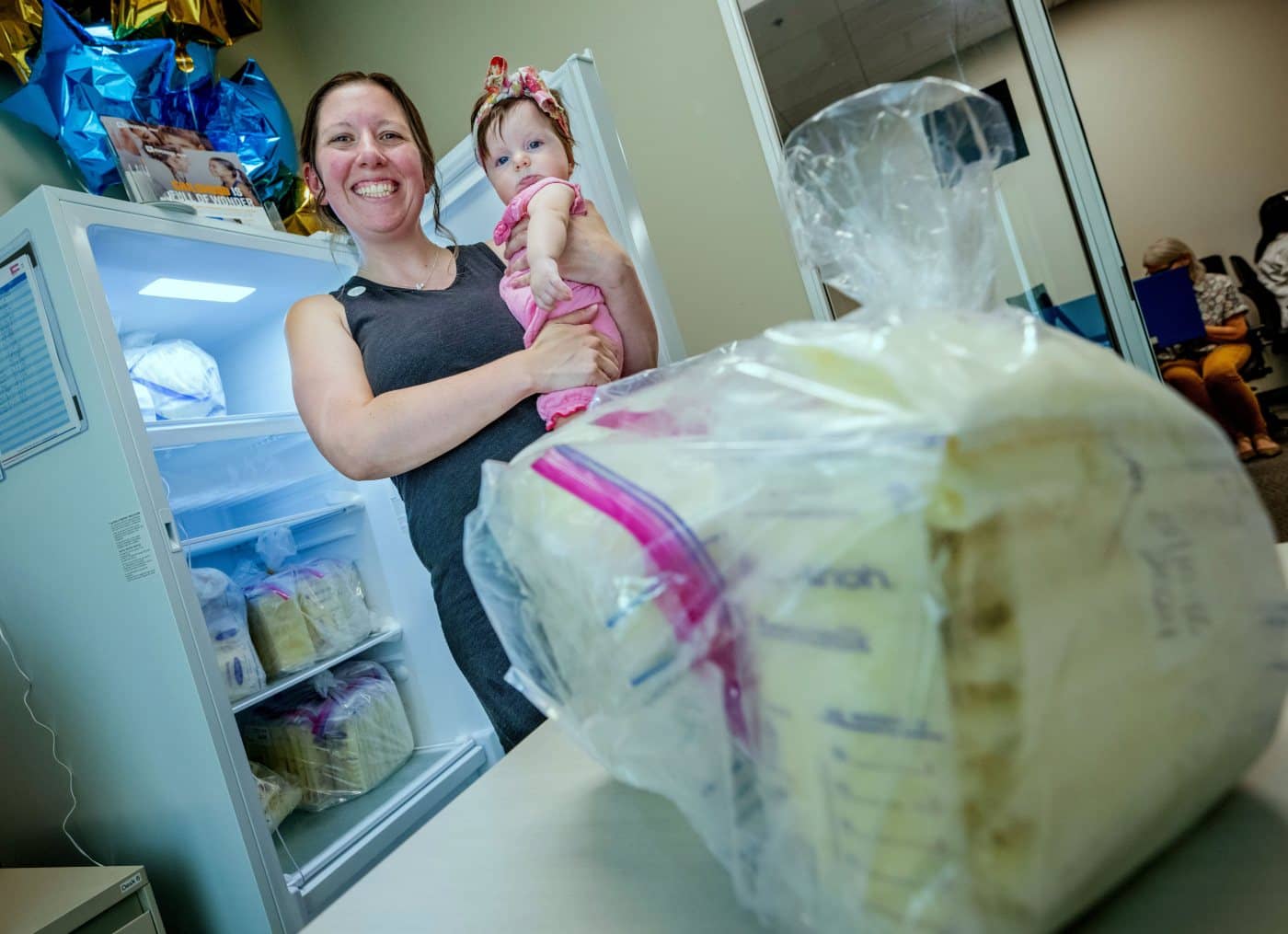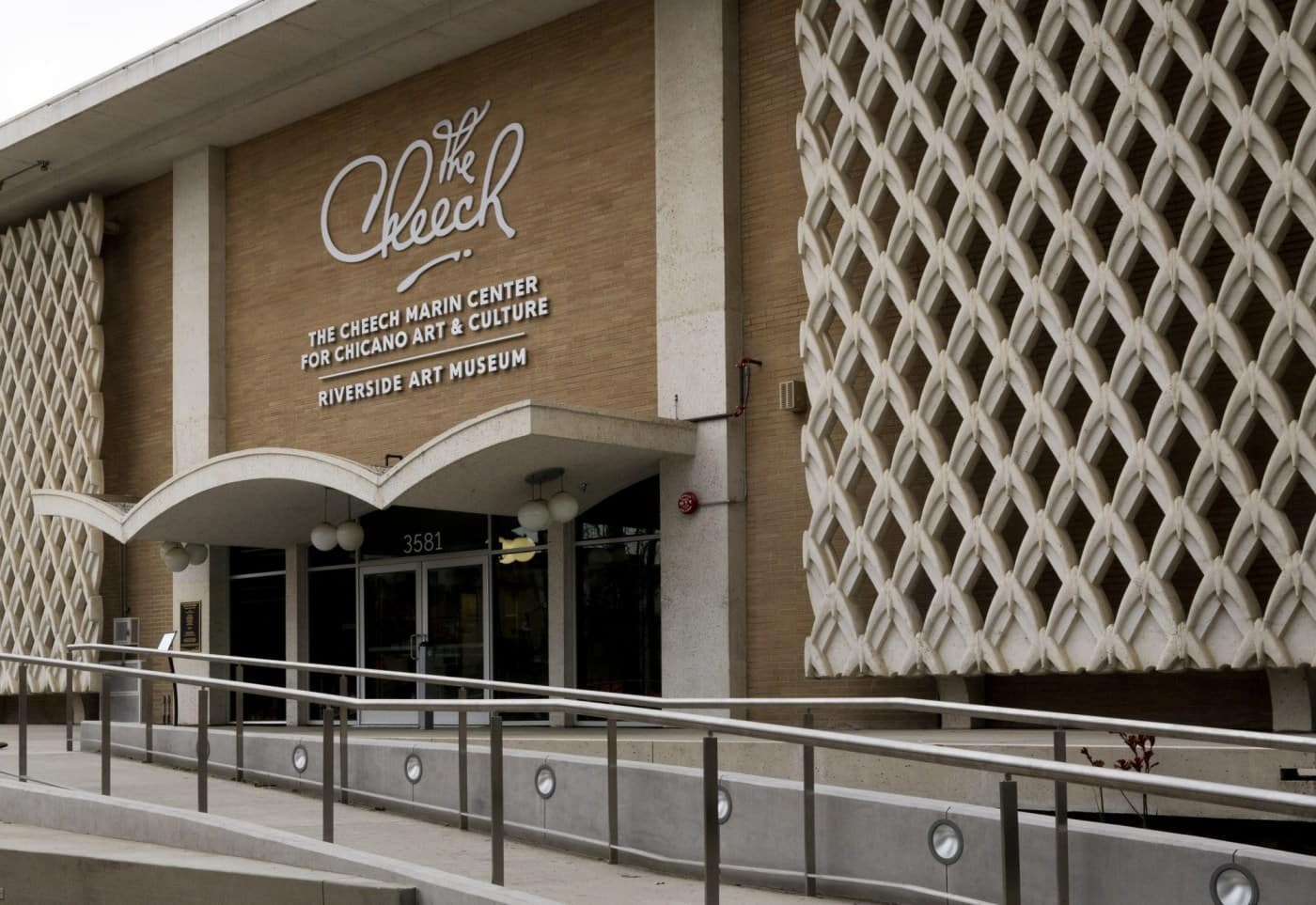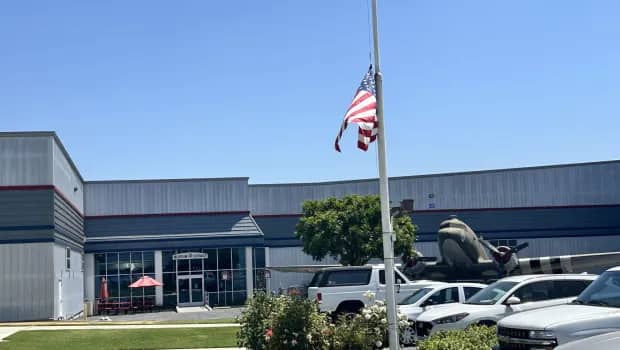By David Downey | Contributing Writer
After the rough delivery of her first child in April, Brianna McFarland worried she wouldn’t be able to breastfeed her daughter, Lara-Jeane.
So she sought help from lactation consultants.
“They walked me through how to pump, how to feed her, you know, all those things,” she said. “And I started producing way more than I could ever imagine. I could probably feed multiple children.”
That gave birth to another worry: where to store the extra milk.
McFarland, 28, who lives in Cherry Valley, quickly filled a garage freezer.
“The milk is starting to come inside the house now,” she said. “And my husband’s like, ‘Where’s all our food going to go?’”
Then someone suggested donating the surplus breast milk. In July, she started delivering milk — in frozen packages — to a new collection site in Riverside that serves the Inland Empire.
On Wednesday, Sept. 4, she made her fourth such contribution to the UCR Health Milk Depot by dropping off a package containing 750 ounces.
“Thank you for donating,” said Dr. Brenda Ross-Shelton, a maternal-fetal medicine specialist at UCR Health who oversees the depot.
“Thank you for existing,” McFarland said. “What would I do without you?”
Milk brought in by McFarland and others will be used to feed newborn babies struggling to survive, Ross-Shelton said.
“It’s like liquid gold to them,” she said. “And that’s not exaggerating at all.”
Center urges women to donate
UC Riverside’s milk depot operates out of the UCR Health Inland Empire Women’s Health Center in Riverside’s Mission Grove neighborhood.
Laurie Haessly, a registered dietitian nutritionist and lactation consultant who serves as programs manager for the Inland Empire Breastfeeding Coalition, said the depot is believed to be the first of its kind in the region.
“For years and years we’ve been talking about it, advocating for it,” Haessly said.
Many mothers are surprised to learn that donating is an option, she said.
“A lot of people don’t know that there is such a thing as a milk bank.”
Haessly said the collection center’s opening should change that perception and encourage more women to donate — and ultimately save babies’ lives.
The depot is teaming up with UC Health Milk Bank in San Diego, which is owned and operated by UC San Diego Health.
Donor milk is stored temporarily in a refrigerator-sized freezer in Riverside, then shipped to San Diego. There, said Alison Wolf, UC Health Milk Bank’s executive director, the milk is tested and pasteurized.
Much of the milk then is delivered to neonatal intensive care units in hospitals across Southern California, Wolf said. The list of receiving medical centers includes Loma Linda University Children’s Hospital, Rancho Springs Hospital in Murrieta and Redlands Community Hospital.
Many recipients are babies who were delivered very early or born with an abnormally low weight, and whose mothers who don’t produce an adequate amount of milk.
According to a Johns Hopkins Medicine webpage, the nutrients in breast milk are better absorbed by babies, when compared to formula, and are better for brain growth and eye function.
Babies fed breast milk have “far fewer” digestive, lung and ear infections, the webpage states.
Breast milk also provides strong protection against a life-threatening intestinal disease called necrotizing enterocolitis. Premature and abnormally small babies are at a high risk of contracting the disease.
“Breast milk is more than nutrition, it’s medicine,” Wolf said. “It makes a difference in saving a baby’s life.”
Few options to donate breast milk
Breastfeeding provides benefits for mom, too, Ross-Shelton said.
“Breastfeeding increases her metabolism, she loses weight faster, she’s less likely to become diabetic,” Ross-Shelton said, citing a few examples.
Haessly said she is optimistic the collection center’s presence in the Inland Empire will encourage more women to breastfeed.
More moms will donate milk, too, she said, and more babies will be saved, as word of the opportunity to donate locally spreads.
The opportunity has been limited in California, Ross-Shelton said.
“On the West Coast, there was really only one (milk bank) for a long time, and that was in San Jose,” she said.
With the opening of the UC Health Milk Bank in San Diego in August 2020, Ross-Shelton said, that made “breast milk a little more available to the Southern California region.”
The reach of the San Diego bank has been expanding.
The number of bank donors grew 9% from 341 in 2022 to 373 last year, and total donations increased 7% from 248,827 ounces of milk to 265,723 ounces in 2023, according to statistics provided by Wolf.
A total of 231,631 ounces was dispensed last year, Wolf wrote in an email.
Now the San Diego bank is getting contributions from McFarland, the new Cherry Valley mom, and other Inland Empire women.
The UCR Health Milk Depot is not funded by the university system, officials said, and operates strictly on financial donations. A donation from the charity ECHO helped get the center off the ground, a UCR news release states.
As for milk donations, McFarland makes one every few weeks, to “empty out a shelf and a half of my freezer, to make room for the new milk.”
When she began feeding her daughter, McFarland was producing 40 extra ounces daily.
“Now with her eating a little bit more, I’m down to 36 ounces extra every day,” she said.
McFarland is enthusiastic about giving away the surplus.
Related Articles
California’s COVID booster rates are dismal as new shot debuts. More sickness ahead?
The technology used to make the COVID vaccine may be key to pancreatic cancer treatment
Disability rights activist pushes government to let him participate in society
How shadowy middlemen profit at the expense of independent pharmacies and patients
America is trying to fix its maternal mortality crisis with federal, state and local programs
“I know it’s helping other people who wish they had my problem,” she said.
“I call it a problem. It’s probably actually a blessing. I’m so happy to give it to people who need it.”
DONATING MILK
Women who would like to donate breast milk may call 858-249-6455, or email ucmilkbank@health.ucsd.edu
There are five steps involved in donating:
Register online
Complete questionnaires on medical history and current medications
Do a phone interview of about 15 minutes
Sign consent and release forms
Take a blood test and drop off milk
For information, click here.
Sources: UC Riverside, UC Health Milk Bank



